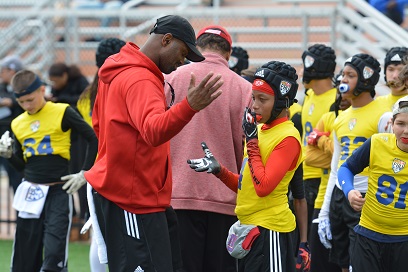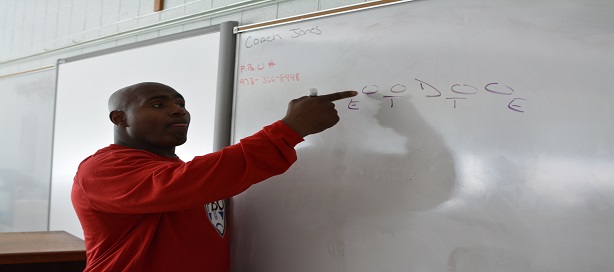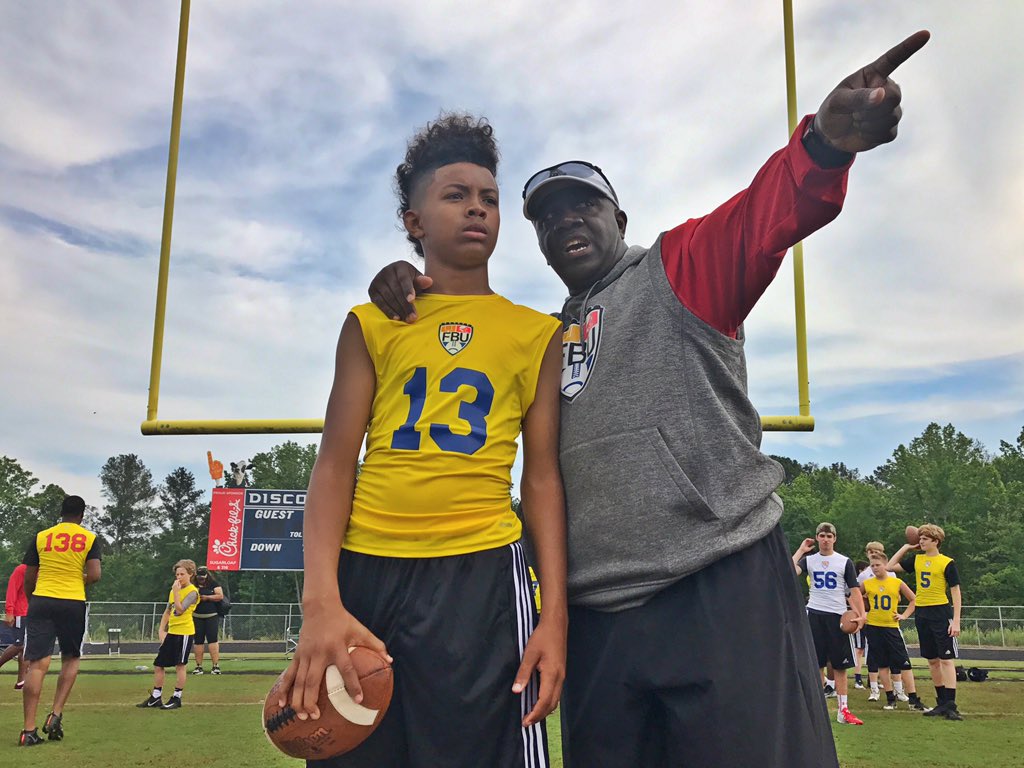What football camp should I go to?
The question is posed often; just as often, a family has little background on the benefits of the hundreds of camps available. They’re presented with pure sales pitches and false promises: “get recruited”; “get ranked”; “the best coaching staff”; “build a national profile”. Very rarely are these fulfilled, nor are their benefits explained.
The decision to attend a certain camp impacts more than the student-athlete. It affects the entire family; opportunities presented to the student-athlete will differ from event to event. Some events welcome the involvement of parents/guardians/siblings, others do not. Some will have third-party media and recruiting analysts on-site, while some just use their logos on flyers as bait. Others still present the next step to a larger event to further athletic development, yet some have no end goal in sight.
Here’s how to determine the contenders and spot the pretenders.
1. The coaching staff.

Who is your athlete learning from?
Maybe the most important indication of the event your family should attend is the coaching staff.
Take a visit to the camp’s website and see if the coaches are listed anywhere. If they’re on the main menu and they’re highlighted on the homepage, chances are it’s for a reason: the coaches are good, and they’re qualified to train and teach your student-athlete no matter what age they are. That organization clearly values what your student-athlete is learning, and from whom.
Can’t find a coaches page? That’s for a reason as well. They’re not too concerned with the quality of what’s being taught. Any local coach will do for these camps. When it comes to an investment in your student-athlete — which is what these experiences should be, an investment — you should shy away from those events and look elsewhere.
Next, how many qualified coaches are there for each position? Will the event have one NFL coach/player in attendance? Better yet, is there an NFL-experienced coach/player at every position? Check out the individual camp pages on the website of the event in question: are the coaches listed, and named, on each camp page? Visibility and transparency are important for any organization to build trust with any family, not just for a football family. If you can’t find who your son will be learning from, how can you trust their camp instructor (and instruction as a whole) is valuable?
2. The curriculum.

What type of event are you looking for?
Visit any football camp event website and there will be some prominent information about what the athlete will be doing. Technique; fundamentals; full contact; 7-on-7 or 1-on-1 competition; combine drills; evaluation clinic — the descriptions go on and on.
Sometimes, a camp will have every single one of those listed on its website for one single camp curriculum. If you can’t decide what you’re about, then what are you about?
Player safety is of the utmost importance in today’s game, from the pros down to first grade. In high school football, 58% of concussions occur in practice, not in games (source). At the NFL level — where they’ve made the transition to limiting contact during practice throughout the year — that number is as low as 4% (source).
The first red curriculum flag would be the words “full contact”. The organization will sell you on the idea that their full contact curriculum was developed for all levels of play. And yet, the highest level of play, the National Football League, doesn’t practice in a full contact environment. Simple.
Next, what does a day at the event look like? Is it comprised of one on-field practice session and lunch, with nothing else at all? What about that will help your athlete improve? What about that is worth the investment? Camps that are truly committed to developing young men give a little bit more detail and have a lot more value. The very best dedicate time off the field, too, with X’s and O’s on the whiteboard and every drill being filmed for tape analysis in the classroom.
3. The progression.

Is there a path to follow? Where does the path lead?
Very rarely is there a beneficial next step in the process — the key word here is beneficial. Understand that in many cases there are next steps, in some cases there are numerous next steps, but many have no value whatsoever in the development of student-athletes. To put it another way, they won’t help you get better. So ask yourself next time you get an e-mail, what’s the progression from one event to the next? Is it a calculated model that increases the level of pressure and competition as you progress? Does it promote a maximum learning environment or are they just looking to fill a national team roster?
Getting better first will lead to getting exposure later. The college camp circuit could place you on a field with 499 other players who are as fast, as strong, or as determined as you. In front of coaches who could decide your future and keep you debt-free after you graduate, you don’t want to show up with one hammer and a couple nails in your toolbox. They’ve seen thousands of athletes come through their programs with one good skill and zero others. You want to have a full set of tools when you’re on campus hoping to earn an offer with your performance because the athletes that show up with advanced technique will immediately stand out and separate themselves from the pack. Your national team/All-American selection as a 7th-grader was probably warranted, but what set of equipment did you add to your toolbox because of it?
Does the organization’s process lead to development that will benefit the athlete for years to come, or is it about recognition today?
4. The mission.
Ask why, and ask what: why does this organization exist? what is the guiding vision? why do they want you to attend their event? what are they offering my athlete?
Is the upcoming event for your middle school athlete promising they’ll “get ranked” and “get exposure”? Will your sophomore be on a field with 999 others at a combine this weekend? Did you get a postcard that promises an appearance from an NFL player with an asterisk next to his name (and the fine print notes that the player is subject to change)?
If you answered yes to any of these, what is the overall value to your family as a whole? What is the one clear goal to any of the above?
Football University has one clear mission: help football players get better. FBU is where getting better starts. Our tagline is Get Better Here. It’s written on our homepage. It’s our header on our social media pages. It’s on all of our flyers and postcards. Come to our office — it covers our walls and our whiteboards and it fills our discussions.
So, what football camp should you go to?
Do your research, make sure it’s the right investment.
Your point of view caught my eye and was very interesting. Thanks. I have a question for you. https://accounts.binance.com/el/register?ref=WTOZ531Y
Can you be more specific about the content of your enticle? After reading it, I still have some doubts. Hope you can help me. https://accounts.binance.com/en/register?ref=P9L9FQKY
I may need your help. I tried many ways but couldn’t solve it, but after reading your article, I think you have a way to help me. I’m looking forward for your reply. Thanks.
I don’t think the title of your article matches the content lol. Just kidding, mainly because I had some doubts after reading the article.